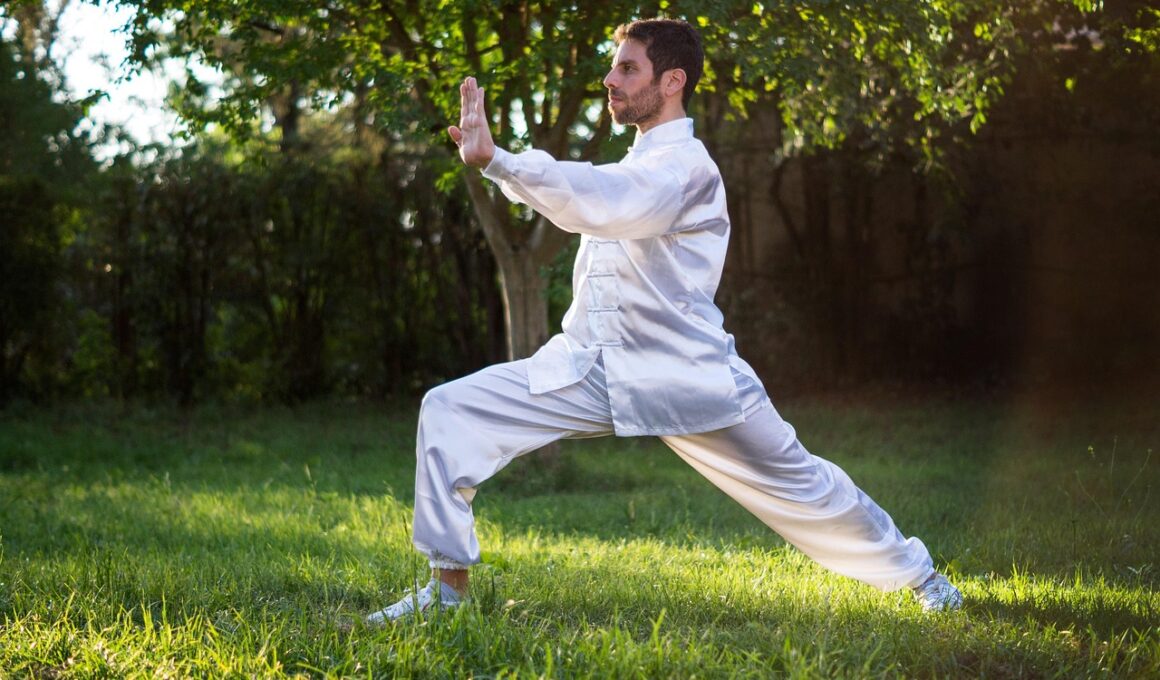Martial Arts as a Meditative Physical Discipline
Martial arts are known for their rigorous physical demands and combat techniques, but there lies a deeper essence: their meditative qualities. These practices combine physical movement with mental focus, promoting self-awareness and inner peace. Meditative disciplines within martial arts, such as Tai Chi, emphasize rhythmic movements combined with controlled breathing. This approach transforms physical training into a holistic experience, merging body and mind. The philosophy behind pushing our physical limits goes far beyond mere competition; it involves personal growth through introspection. Additionally, martial arts philosophy encourages practitioners to attain tranquility amidst chaos, preparing them for both physical confrontations and life’s challenges. Engaging in these practices cultivates discipline, respect, and a better understanding of oneself. Essential concepts include harmony, balance, and resilience. Out of these principles arise valuable life lessons that can be applied beyond the training mat. Reflecting on these teachings, one can learn the importance of persistence, mindfulness, and focus. In this journey through martial arts, practitioners not only hone their skills but also develop a profound connection between spirit and physicality.
The Philosophical Foundations of Martial Arts
The philosophical foundations of martial arts deeply influence practitioners. This philosophy transcends physical techniques, encompassing moral and ethical guidelines. Essential components include respect, humility, and perseverance, fostering character development among practitioners. The journey through martial arts philosophy is akin to a quest for wisdom and self-discovery. By exploring concepts such as “Dojo Kun,” practitioners gain insight into important values. They are encouraged to practice for self-improvement and not merely for fame. Engaging with these philosophical principles, one begins to grasp how martial arts shape one’s character, revealing a path toward enlightenment. Additionally, understanding our limits and boundaries through martial arts fosters personal growth. The journey teaches us to respect others, reminding us of our interconnectedness. Commitment to the practice nurtures patience and understanding, virtues highly regarded in all cultures. The integration of philosophy and physicality results in a comprehensive discipline that benefits practitioners outside combat sports. From mindfulness in movement to ethical behavior in daily life, martial arts philosophy equips individuals with crucial skills for emotional and mental resilience. This synthesis of philosophy and martial arts enhances the overall experience.
Meditation practices, often overlooked in martial arts, play a crucial role in cultivating mental clarity. Many practitioners employ meditation to enhance focus and self-awareness, ultimately improving their performance. Breathing exercises and visualization techniques help sharpen concentration and emotional control. Additionally, the act of meditation cultivates an understanding of one’s inner thoughts and feelings, supporting personal growth. Different martial arts incorporate various forms of meditation. For example, Zen practices in karate emphasize clearing the mind and embracing the present moment. Finding stillness amidst movement is essential for developing practical and spiritual skills. Through these practices, individuals learn to manage stress and anxiety, gaining resilience in daily life. Practicing martial arts as a meditative discipline can transform one’s perspective, both personally and in social contexts. Engaging with the philosophy encourages individuals to cultivate self-discipline and patience, enhancing their approach to life’s challenges. Ultimately, meditation becomes a vital component, facilitating a balance between physical prowess and mental well-being. Practitioners emerge not only as skilled combatants but as more aware, grounded, and resilient individuals. This holistic approach blends motion with stillness, allowing personal transformation through understanding the concept of mind over matter.
Emotional Benefits of Martial Arts
Martial arts provide substantial emotional benefits, creating a supportive environment for personal growth. Engaging in these physical disciplines fosters self-confidence and enhances one’s self-esteem. Practitioners often experience a sense of empowerment through mastering techniques and overcoming challenges. The journey involves developing the ability to face various obstacles, both in training and life. This process instills resilience and determination, valuable traits in any endeavor. Moreover, martial arts communities offer camaraderie and mutual support, strengthening interpersonal bonds among practitioners. Within this supportive environment, individuals share experiences, foster friendships, and motivate one another. The connection experienced during training fosters emotional well-being. In addition to building social bonds, martial arts contribute to improved mental health by promoting stress relief. The combination of physical activity and focused breathing allows individuals to release pent-up tensions and anxieties. Practicing martial arts aids in emotional regulation, leading to a higher sense of emotional stability. By learning how to channel emotions constructively, individuals become better equipped to navigate the complexities of life. Ultimately, engaging in martial arts not only nurtures the body, but also nurtures the mind and spirit, promoting a more holistic sense of well-being.
As martial arts practitioners delve deeper into their practices, they often explore the concepts of balance and harmony. This exploration reflects the core philosophy of martial arts, where movement flows naturally and efficiently. The concept of yin and yang exemplifies this balance, emphasizing the harmony between opposing forces. Achieving balance between speed and control, strength and flexibility enhances physical performance. But balance extends beyond mere physicality; it resonates within personal and social realms. Practitioners learn to find tranquility amidst the chaos of life, fostering a sense of calm. The cultivation of harmony influences relationships, inviting compassion and understanding into interactions. When one embodies balance, it radiates to others, creating ripples that promote peace in communities. Achieving balance transforms challenges into opportunities for growth. It encourages adaptability and resilience, necessary aspects of life. Practitioners become aware that mastering martial arts requires perseverance and continuous improvement. The consistent pursuit of balance empowers individuals to rise above adversity and remain grounded. Ultimately, realizing this principle fosters a sense of fulfillment and purpose, guiding practitioners along their unique paths. As they embody the art of balance, they contribute positively to their communities, promoting unity and harmony.
The Role of Mindfulness in Martial Arts
Mindfulness plays a pivotal role in martial arts training, optimizing the connection between body and mind. This practice encourages practitioners to engage fully with each moment, enhancing their physical responses. The ability to remain present allows individuals to absorb techniques and concepts effectively. Through mindfulness, practitioners fine-tune their movements, ensuring optimal performance in their training. In addition to physical prowess, cultivating mindfulness nurtures emotional intelligence. The emphasis on living in the moment prepares individuals to handle various life situations with grace. Mindfulness teaches the importance of listening—to oneself and to others—fostering better communication and understanding. Learners will also discover that the skills acquired on the mat translate to everyday challenges. The practice of mindfulness strengthens the capacity to remain calm under pressure, aiding in conflict resolution. As practitioners explore this connection, they expand their capacity for empathy and compassion. The emphasis on mindfulness breaks down barriers and paves the way for enhanced relationships. Over time, these skills create profound transformations within individuals, inspiring a commitment to live authentically and with intention. Ultimately, incorporating mindfulness within martial arts enriches the journey towards self-discovery and confidence.
Martial arts as a meditative physical discipline offers a unique journey toward self-discovery, providing practitioners with skills that transcend the sport itself. The integration of mental and physical practices nurtures a holistic experience that enhances personal growth. Beyond self-defense and fitness, martial arts cultivate character, emotional health, and resilience. Through engaging in meditation, mindfulness, and philosophical exploration, practitioners develop tools for navigating life’s complexities. The discipline fosters a sense of community, connecting individuals through shared experiences and mutual support. The principles learned within martial arts enhance social dynamics and relationships, opening pathways for compassion and understanding. As practitioners refine their techniques, they gain not only physical expertise but also a valued sense of self. The transcendence of martial arts philosophy into everyday life creates individuals equipped to face obstacles with flexibility and strength. By embracing the meditative aspects, practitioners can foster a deep connection between body, mind, and spirit. Ultimately, martial arts become a vehicle for continuous personal transformation and profound understanding. As individuals journey along this path, they emerge not only as capable martial artists but also as enlightened beings committed to growth and connection.
The exploration of martial arts as a meditative physical discipline profoundly enhances the understanding of one’s self and surroundings. Understanding the nuanced philosophy and techniques increases awareness of life’s challenges and opportunities. Whether entering the mat for training or the dojo for contemplation, martial arts serve as a refuge, promoting personal and emotional growth. Through practice, individuals develop self-discipline and resilience, equipping them to tackle everyday situations with courage. By embracing these attributes, practitioners reflect on their experiences and take responsibility for their journey. The unity of mind and body fosters an internal dialogue that promotes self-awareness and introspection. Practical skills learned through martial arts engage individuals in the present, allowing for greater focus and improved concentration. Socially, this journey creates a network of mutual support, encouraging friendship and camaraderie among practitioners. Overall, martial arts embody a pathway toward enlightenment, cultivating virtues that resonate within daily life. This cultivation serves as a foundation for personal transformation and community building. Through continual practice, individuals embody the principles of martial arts, enriching their lives and those of others. Balancing physicality with mindfulness, martial arts become an essential practice in navigating life.


